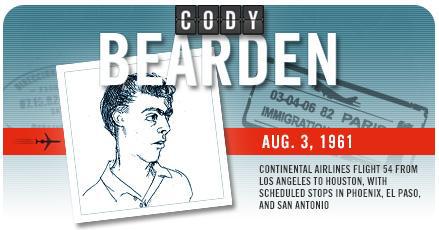In the late 1960s and early 1970s, the United States suffered through a skyjacking epidemic that has now been largely forgotten. In his new book, The Skies Belong to Us: Love and Terror in the Golden Age of Hijacking, Brendan I. Koerner tells the story of the chaotic age when jets were routinely commandeered by the desperate and disillusioned. In the run-up to his book’s publication on June 18, Koerner has been writing a daily series of skyjacker profiles. Slate is running the final dozen of these “Skyjacker of the Day” entries.
Name: Leon and Cody Bearden
Date: Aug. 3, 1961
Flight Info: Continental Airlines Flight 54 from Los Angeles to Houston, with scheduled stops in Phoenix, El Paso, and San Antonio
The Story: The first outbreak of America’s 11-year skyjacking epidemic occurred in the summer of 1961, when four planes were seized in the nation’s airspace. The last of these incidents, involving 16-year-old Cody Bearden and his father, Leon, is the one that finally forced the federal government to pay attention to the escalating crisis.
The elder Bearden was a convicted bank robber and father of four who, due to a host of financial and psychological problems, had decided that the United States was rotten to the core. He roped Cody, his guitar-playing eldest son, into a plot that would allow them to start fresh in Cuba: Their plan was to give Fidel Castro a $5.4 million Boeing 707 as a gift and thereby earn political asylum.
The Beardens boarded the red-eye flight in Phoenix with two loaded handguns tucked into their carry-on bags. (At that time, there was absolutely no baggage screening at American airports.) En route to El Paso, Leon and Cody forced a stewardess to issue a call for volunteer hostages over the jet’s public address system. Four men came forward to meet the hijackers in the plane’s first-class lounge, including a lanky Border Patrol agent named Leonard Gilman.
Leon Bearden told the volunteers that he had ordered the pilot to keep flying to El Paso. After the plane refueled, he and Cody would release all the passengers, save for the four volunteer hostages. The plane would then veer southeast to Havana.
As the Boeing 707 began its descent, Gilman gently asked Leon Bearden if he wished to go to Cuba for political reasons. “I’m just fed up,” Leon replied. “I don’t want to be an American anymore.”
By the time Flight 54 touched down in El Paso at 2 a.m., President John F. Kennedy had been briefed on the situation. Loath to hand his Cuban nemesis another public relations victory so soon after the Bay of Pigs fiasco, the president authorized the FBI to do everything in its power to prevent the hijacked plane from leaving Texas.
At the FBI’s behest, Continental’s ground crew stalled for time after the passengers were released, pretending that the jet required hours of maintenance. As the sun began to rise that morning, Leon Bearden became highly agitated by the endless delays. He commanded Flight 54’s captain to take off at once, punctuating his directive by firing a bullet between the co-pilot’s feet.
But the trip to Havana lasted less than 50 yards. As the Boeing 707 pivoted toward the runway, a dozen federal agents opened fire with submachine guns, shredding the jet’s landing gear and destroying one of its engines. The stranded Beardens were left with no choice but to let an FBI negotiator come aboard the aircraft. But Leon had become too unhinged to strike any sort of deal. “I would rather be killed myself than go to prison,” he told the negotiator. “I’d rather kill myself.”
An instant after making this suicidal threat, Leon glanced back to see the flight attendants sneaking out the plane’s rear exit. Before he could do anything drastic, Gilman punched him in the ear with all his might, shattering a bone in his right hand in the process. As the hijacker crumpled to the floor, the FBI negotiator spun and tackled Cody, who had let down his guard while listening to his father’s rant.
The Upshot: A day after the Beardens were subdued, the Senate held an emergency hearing to address the nation’s rash of hijackings. As part of that hearing, a senator asked Najeeb Halaby, the head of the Federal Aviation Administration, whether anyone had considered the possibility of searching all passengers prior to boarding. Halaby scoffed at the idea: “Can you imagine the line that would form from the ticket counter in Miami if everyone had to submit to police inspections?” The senators ended up voting to make air piracy an offense punishable by death, but they took no action on security screening. Leon Bearden was later sentenced to life in prison, while Cody accepted a plea bargain that allowed him to be released from custody by his 21st birthday.
